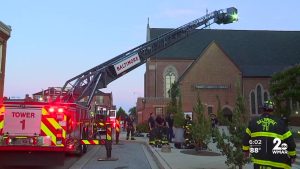Catalyst Question
What’s your favorite remake? It could be a song, movie, or other piece of art. How does it compare to the original?
What’s Wrong with a Remake?
In Luke 3:1-6, John the Baptist cries out, “Prepare the way of the Lord!” Straight paths. Leveled hills. Smooth roads.
It’s all so unoriginal.
Hundreds of years before John’s wilderness prophecy, another prophet said the exact same things. In Isaiah, after Jerusalem is overrun by enemies and God’s people are forced into Exile, the prophet similarly calls for leveled trails and paved streets.
 But is there anything wrong with a remake? Recently, the film adaptation of Wicked–a massively popular Broadway musical–became quite successful in its own right. Story continuations in the Moana and Gladiator universes saw similar support. Remakes are also quite popular with music. Somewhere Over the Rainbow, from the original Wizard of Oz, was recast as a ukulele lullaby by Izzy. Luke Combs’ recent cover of Tracy Chapman’s “Fast Car” reignited appreciation for Chapman’s talent by today’s audiences. It seems there’s something essentially human in connecting our current lives with stories from our past.
But is there anything wrong with a remake? Recently, the film adaptation of Wicked–a massively popular Broadway musical–became quite successful in its own right. Story continuations in the Moana and Gladiator universes saw similar support. Remakes are also quite popular with music. Somewhere Over the Rainbow, from the original Wizard of Oz, was recast as a ukulele lullaby by Izzy. Luke Combs’ recent cover of Tracy Chapman’s “Fast Car” reignited appreciation for Chapman’s talent by today’s audiences. It seems there’s something essentially human in connecting our current lives with stories from our past.
In that light, John the Baptist doesn’t appear lazy. Instead, he seems deeply connected with the human condition. And of course, getting connected with the human condition is just what God is up to in Jesus.
Advent is a time when we can appreciate the present relevance of ancient stories. Isaiah was a prophet who saw his homeland conquered by an outside empire (Babylon). John the Baptist was a prophet who saw his homeland conquered by an outside empire (Rome). Both of them saw the need for God in the midst of that suffering. Both of them wanted any obstacles removed that might prevent God’s quick arrival. John remembered Isaiah’s prophecy. John found resonance with Isaiah’s ancient words for his present situation. And so, John recast those words for his own life.
Just like John’s prophecy, your prayer life doesn’t need to be original to be meaningful. Sometimes, the words of scripture sum up just how we feel. At other times, worship lyrics give voice to the depth of our hearts. Not only can we learn from the faith of those who came before us. That faith can carry us in moments when our world seems to fall apart.
Ask Yourself: What is one example of a Bible story, a piece of spiritual art, or a person from church history that can help strengthen your faith today?
Ask a Friend: In this Advent season, as we wait for Jesus to arrive among us as a baby in Bethlehem, what obstacles might be preventing us from finding our way to the manger? What can we do to follow John’s (and Isaiah’s) encouragement to remove those roadblocks?
Finally, remember to take this survey and give your feedback about Faith Lens as we consider the path ahead for this devotional resource!




